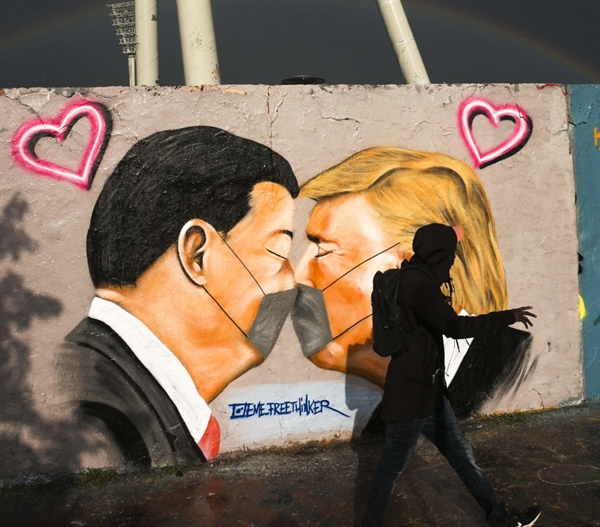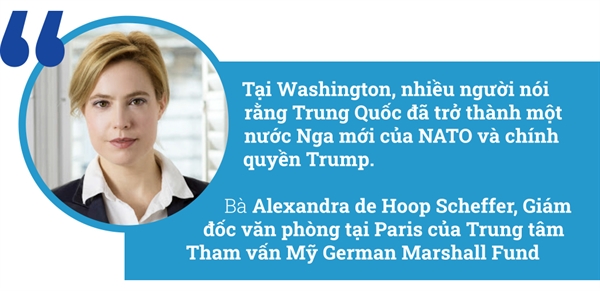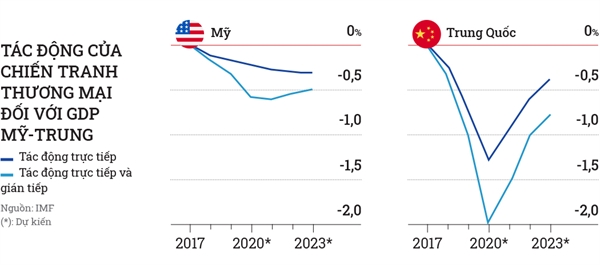“US-China caught in the ”Thucydides Trap” News 11/08/2021
Covid-19 Pandemic adds fuel to US-China Confrontation, igniting a New Cold War with the risk of engulfing not only these two powerful countries but also the rest of the world.
According to Reuters, a report from the China Institute of Contemporary International Relations (CICIR) warns that Beijing is facing an increasing wave of hostility from external following the Covid-19 pandemic, which could escalate US-China relations to a military conflict. Reuters’ sources reveal that this internal report has been submitted to the highest-level Chinese leaders, including the General Secretary and President, Xi Jinping.
Increasing wave of hostility
The report concludes that the Global Anti-China Sentiment reaches highest level since the Tiananmen Square Incident in 1989, according to Reuters sources. Beijing is now facing a wave of opposition led by the United States following the pandemic and needs to prepare for the worst-case scenario of a potential military conflict between the two countries.

While the likelihood of a conflict between these two powerful countries remains low, it is evident that the pandemic has become a catalyst, eroding the trust between US and Chinese leaders to its lowest point since 1979. With the uncertainty surrounding the end of the pandemic, Beijing is clearly confronted with mounting opposition to its global ambitions in a post-pandemic world characterized by a ‘disorderly’ order.
Director of the Institute for the Analysis of Global Security, Gal Luft, and China expert George Magnus from the China Centre at the University of Oxford, assert that the current crisis is a “darkness surrounding” and has a more negative impact on US-China relations than any other issue up to now. International relations in the post-pandemic world are poised to become more tense.
Negative attitudes towards China will continue to escalate as the United States enters the presidential election cycle. As the election draws closer, President Trump finds it increasingly challenging to de-escalate his confrontational approach towards China. Scott Kennedy, Senior Advisor at the Center for Strategic and International Studies, suggests that both President Xi Jinping and President Trump hold nationalist sentiments, making it difficult for them to lean towards cooperation and instead using this tension to address domestic issues.

In terms of the future of US-China relations, Gal Luft, Director of the Institute for the Analysis of Global Security, and Yun Sun, a senior fellow at the Stimson Center, believe that a crisis like the current pandemic will not completely alter the existing balance of power or immediately give rise to a new power structure. However, in the short term, the United States and other countries will continue to exert pressure on China, particularly regarding its responsibility for the global spread of the virus beyond its borders.
There are several reasons for confrontation
“The COVID-19 pandemic is deepening existing tensions between the United States and China and could ignite a New Cold War,” said by Clete Willems, former White House trade advisor. The US-China tensions related to COVID-19 are showing signs of spilling over into the trade arena, as recently on May 3rd, President Trump threatened to terminate the phase one trade deal if China fails to adhere to its commitments of purchasing 200 billion USD worth of goods.

Donald Trump and Xi Jinping, each have reasons to reignite the Cold War, an inevitable conflict as both sides need it to survive. The outcome of the upcoming November election may change the tone of voice for each party, but the trajectory remains fixed. In Washington, whether Republican or Democrat, no faction wants to be seen as weak, unable to control China. Therefore, both Washington and Beijing are aware of the “Thucydides trap” – an inescapable war between a dominant power and a rising power vying for control.
The national security strategy of the Donald Trump administration views China as a “strategic competitor” that needs to be countered in all areas. The West is also paying more attention to the threat posed by China, as Russia shows signs of becoming more conciliatory since the onset of the COVID-19 pandemic. Alexandra de Hoop Scheffer, Director of the Paris Office at the German Marshall Fund’s American Consulting Center, comments, “In Washington, many people say that China has become the new Russia of NATO and the Trump administration.” Similar to the approach with Russia in the past, the issue of China has garnered bipartisan consensus and dominates the political discourse in the United States.

Since assuming power, Chairman Xi Jinping has not concealed his ambitions, even resorting to military intimidation. From the moment he took the highest position of authority, Xi Jinping declared the “Chinese Dream” – a step towards China emerging from its “hidden” phase to join the ranks of superpowers, altering the balance of power between China and the West.
Since then, Beijing has fueled a series of aggressive actions, from stoking tensions in the South China Sea to ambitiously exerting influence across continents through the Belt and Road Initiative, using a range of debt-trap “carrots.” In fact, faced with China’s ambitions, even Moscow is concerned about being overshadowed strategically by China. Russia is struggling to find its place in a bipolar world dominated by the United States and China. Therefore, during a press conference with foreign media, Enrico Letta, Chairman of the Jacques Delors Institute, suggested that Russia is attempting to reposition itself closer to both Europe and the United States, employing a series of conciliatory and cooperative gestures.
The global consequences of a new Cold War between the United States and China would be more severe than the previous Cold War between the United States and the Soviet Union.
This is because, while the Soviet Union at that time was a declining powerful country with a failed economic model, China is on the verge of becoming the world’s leading economic powerhouse and continues to grow. Furthermore, the trade exchange between the United States and the Soviet Union was minimal, whereas China has fully integrated into the global trade and investment system, with close interactive relationships, particularly with the United States. Therefore, the Thucydides trap in the 21st century poses a risk of engulfing not only these two powerful countries but also the rest of the world.
Source: https://nhipcaudautu.vn/chuyen-de/my–trung-truoc-bay-thucydide-3334787/






